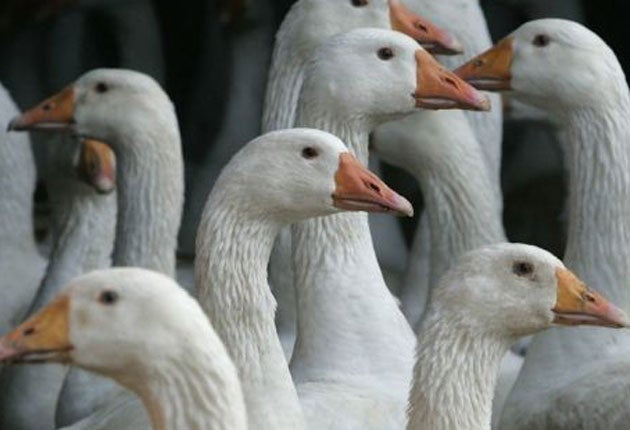Wildlife under aerial attack
The US aviation industry has taken extreme measures against birds in the name of safety. But in Britain, the approach is more humane. Alice-Azania Jarvis reports

It is a mystery that has occupied – if not quite the nation – then, at least, the neighbourhood. In Brooklyn, New York, residents were left scratching their heads after the squawking, screeching inhabitants of Prospect Park suddenly vanished. Seemingly overnight, the local geese – almost 400 of them – went. But to where?
The answer, it transpired, was the great birds' nest in the sky. The geese, beloved by locals for their grace and insatiable appetite for stale breadcrumbs, had been rounded up by biologists from the United States Agricultural Department, taken from the park, and lethally gassed. They were, a spokesman reportedly said, a threat to aeroplane safety. Ever since two flocks of Canada Geese flew into the US Airways Flight 1549 and caused an emergency landing on the Hudson river, authorities have been thinning their numbers.
The fact of the matter is that birds are dangerous to aeroplane passengers; more that 350 deaths are thought to have been caused by so-called "birdstrikes," and they are responsible for significant material damage to aeroplanes. Still, news of the extreme measures being taken in New York have caused consternation. As we jet off on our summer holidays, should our consciences be blackened by the thought of geese being gassed?
In a word: no. Alarming as the incident is, it is not, says John Clare of the Royal Society for The Protection for Birds (RSPB), one that is likely to be repeated in Britain. "Our legislation is very different from that of the US," he insists. "The RSPB works with both sides in a discussion between the industry and conservationists."
Under the Wildlife and Countryside Act, birds and their nests are given blanket protection, except for in certain specified situations. The maintenance of air safety – the reason cited for New York's goose cull – provides one such exception, though any kind of extermination is viewed as an absolute last resort. If it was felt that aerodrome managers were not attempting other options (for instance relocation of habitat or applying scaring techniques), they would be open to legal challenge, with the onus on them to prove their innocence.
"I can't remember a time in recent years that a challenge has been so major that it has come to national attention," says Clare. "Both the Civil Aviation Authority and the Military Air Fields employ scare techniques or habitat management so killing just doesn't happen on a regular basis here." Indeed, Britain's largest airport, Heathrow, has a comprehensive habitat management programme and has been named a global leader by the International Bird Strike Committee.
The General License doesn't, in fact, apply to all birds; for those rarer species not listed in the License agreement, protection procedures are even more rigorous. Two years ago, Stansted Airport's six-man "bird scare" team were confronted with the sight of a large, unidentifiable bird of pray nesting right beside the runway. When their assorted alarms, flares and firecrackers failed to dispel her, they were forced to call the RSPB. On closer inspection, experts realised the persistent hen was, in fact, a Montagu's harrier – one of Britain's rarest birds of prey, named after the distinguished 19th-century ornithologist George Montagu. Only 15 to 20 breed in this country each year and given this particular specimen's good behaviour – she only ever strayed onto the runway when chased by airport security – she was allowed to stay, promptly nicknamed "Monty".
Of course, bird control aside there is a host of other wildlife issues at play when it comes to flying. There's the point of habitat destruction to consider, both when it comes to airport growth and maintenance. The debates over Heathrow's third runway pitted conservationists against expansionists, with the former arguing that the project would threaten foxes, protected bats and pond life. Lydd airport in Kent was a recent source of conflict, after planning advisors claimed that expansion would disrupt the inhabitants of the nearby Dungeness nature reserve, and wipe out acres of rare lichens and plants.
Once built, airports are encouraged to do their best to maintain existing biodiversity. They can strive to meet the Wildlife Trusts' Biodiversity Benchmark and attempt to maintain sustainability. Ultimately, though, there is little they can do to mitigate their gravest ecological footprint. As the RSPB's Clare puts it: "Climate change is the biggest threat to wildlife that there is." Flying, then, with all its associated carbon implications, is a Bad Thing for the animal kingdom. The more flights there are – and the more airports – the worse that effect will be.
To take part in The Independent's Nature Club, email your wildlife observations to natureclub@independent.co.uk; the best entries will be published each month
Join our commenting forum
Join thought-provoking conversations, follow other Independent readers and see their replies
Comments